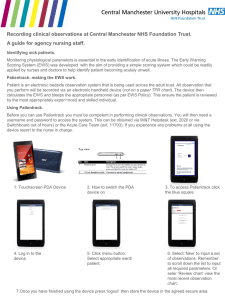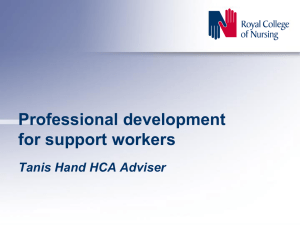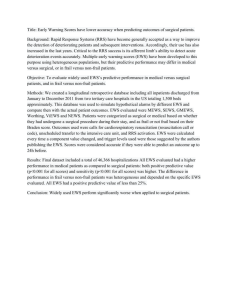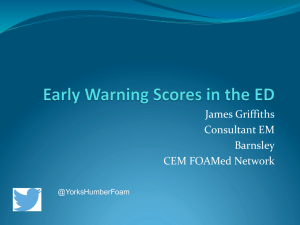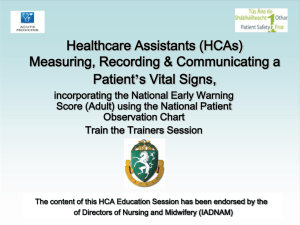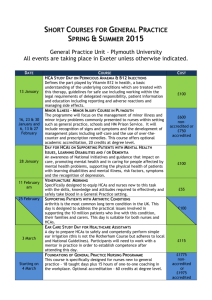Implementing the National Early Warning Score for Healthcare
advertisement
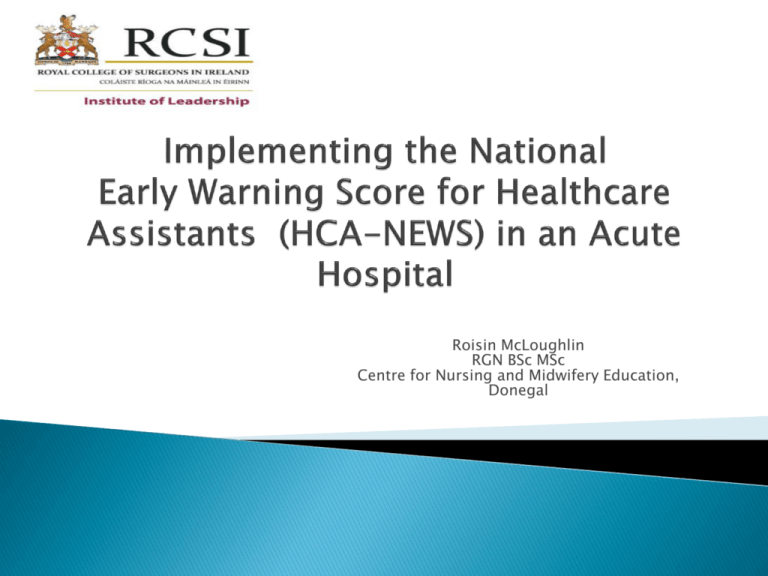
Roisin McLoughlin RGN BSc MSc Centre for Nursing and Midwifery Education, Donegal Organisational change management development project Organisational Context Developing the scope of the HCA role National HCA NEWS education programme 2 To facilitate a process whereby nominated health care assistants (HCAs) would be educated to competently measure, record and communicate patients vital signs including calculating and recording a total EWS using the Adult Patient Observation Chart, and facilitated to safely perform these skills. OBJECTIVES To provide the National HCA-NEWS Education Programme Introduce the HCA-NEWS into Clinical Practice Establish a process to facilitate the HCA to safely perform NEWS Evaluate the impact of the HCA-NEWS in practice 3 Initiation Planning Implementing Mainstreaming The four key Stages HSE Change Model (2008) 4 Local Ethics Committee Approval 14/10/2014 Literature Review Methodology Force Field Analysis Stakeholder Analysis Consultation with a range of key stakeholders – Clinical Nurse Managers were key Application and selection process of HCAs – National Pre Requisites Identifying Registered Nurse Mentors Evaluation Process 5 Literature based on documentation of observations and EWS published during 2009 – 2014 which included studies of HCAs and EWS or track and trigger systems within a general ward setting. The electronic databases searched included CINAHL, Cochrane, Medline, Pub Med and Web of Science. Limited results: Search was expanded to include literature published from 2005 – 2014 A total of 33 articles were selected. Grey literature sources were searched and 10 relevant government agencies documents were used. Exclusion Papers with reference to Maternity early warning scores (MEWS) or Paediatric (PEWS) and EWS within critical care areas 6 Patient Safety and Suboptimal Care Monitoring and Recording Vital Signs and EWS Education and Training in Vital Signs monitoring and EWS Delegation and Competence 7 PLANNING Letter of invitation to HCAs Information on project Signed Consent Pre Questionnaire Project Timeline: October 2014- April 2015 Review Guidelines and Policy 8 Summary of the data collection methods utilised in this project 9 Delivery of HCA NEWS Education programme Six weeks supervised practice & skills demonstration in the clinical area. Independent Self Audit over a two month period HCAs to complete an ISBAR record of Documentation and Communication A full set of vital signs must be recorded each time and documented on the EWS Observation Chart. Every entry must be dated (Day, Month and Year), timed (using the 24hr Clock), complete with Initials & Grade HCA. 10 11 After successfully being assessed competent on 10 occasions, the HCA could measure the vital signs as delegated under the delegation procedure. Each time they measured and recorded vital signs, they maintained a self audit form. 12 600 500 400 300 Days (08:00 - 17:00) Evenings (17:00 - 21:00) 200 Nights(21:00 - 08:00) 100 0 Total number of Total number of Total number of Total number of EWS scores EWS scores EWS scores EWS scores recorded recorded as 0 recorded between recorded above 3 1-3 13 On recording a EWS of greater than 2 or a new score of 1 the HCA was asked to complete this record which was used to communicate a patients total EWS to the RN. Both the HCA and the RN signed the record and this was placed in the Nursing documentation. Education was also necessary for nurse mentors so that they were familiar with the Delegating Procedure and the scope of the project. These education sessions took place on the six clinical areas 14 A system for the HCAs to report findings to the Registered Nurse and to document in the nursing record was developed in Tallaght Hospital and reproduces with kind permission. A report sheet was developed, designed to be printed on sticky paper and placed into the nursing record when complete. Tallaght Hospital Dublin Health Care Assistant Report of Early Warning Score (EWS) EWS Score: Date__/___/_____ Time________ Trigger (please tick) Respiratory rate: O2 saturations: Oxygen therapy: Inspired O2: Heart rate: Systolic BP: Conscious level Temperature: Verbally Reported to: Grade__________________ Nurse PIN________________ Reported By: Grade____________________ Registration No.:__________ Signature____________________ Signature____________________ 15 December 2014, February 2015, March 2015 16 FOCUS GROUS: Overview of themes and sub themes 17 Positive impact on staff Improved communication Improved Teamwork Increased Confidence in Caring More involvement with the patient Created more awareness Value of HCA reinforced The benefits to the patients mostly found at night time where it was felt that the night duty role is more clearly defined 18 FETAC/QQI FET Level 5 Trained HCAs versus HCAs Skill Mix: Deployment of trained Staff Planning rotas; Compromising skill mix Delegation and Competence Competing work - Lack of practice opportunities on day shifts e.g. Student nurses Need to maintain skill through regular engagement in practice 19 The RN continues monitoring and supervising the HCA to demonstrate, develop and maintain competency in undertaking, recording, totaling, and communicating a patients’ vital signs and EWS. This will ensure that skills are maintained and are embedded in safe practice. Continuous evidence in the workplace to demonstrate that: – Patients needs are the priority and patient centred care is evident – Staff are empowered and committed - Policy, protocols and guidelines is adhered to – Quality Standards and goals are achieved (individual, team, organisational effectiveness) A review of the effectiveness of the HCAs role in undertaking the skill of HCA-NEWS is completed at local and national level. 20 Ongoing audit and evaluation should continue to determine - Totalling of EWS and the completeness of observation charts - That patients have a minimum of 12hourly observations recorded - Increased monitoring as per clinical protocol is adhered to - That the skill has been undertaken by the right person in accordance with the patients’ condition Standardisation of HCA’s recording and documenting clinical practices in nursing documentation and patients’ charts is used to record patient information. There is a need for all HCAs to be trained to the same level to maintain standards and ensure clarity of roles and responsibilities. 21 For further information please contact roisin.mcloughlin@hse.ie References available on request Dissertation available on E-publications@rcsi.ie 22
